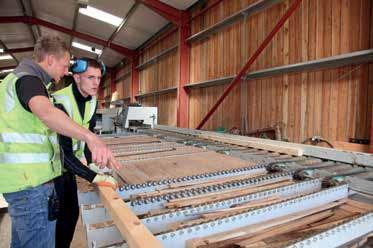
7 minute read
A year like no other
The second wave of COVID, another lockdown, Brexit, COP26, elections, new policies…2021 was a busy year! We round up some of the major changes and events here

Brexit



Brexit came into effect on 1 January 2021. For our sector, the changes have spanned several topics. The use of pallets and wooden packaging for goods moving between the UK and EU is now regulated by international standards. New UK plant passports were also introduced for use within the UK. New requirements on language and salary are now in place for recruiting non-UK workers, while hiring seasonal workers is subject to a very restrictive scheme. As can be expected when change on this scale takes place, there are still some teething problems, and some regulations are still in the process of being fine-tuned. Confor always work closely with the UK Government to represent the views of members and the complications they face. it looks like it will conclude with serious concerns about rising cases. Forestry and wood processing were able to continue working through both lockdowns and Confor was able to secure recognition of wood as an essential product. It is highly unlikely that we will see a third full lockdown, but governments across the UK are calling for people to stay alert and mindful of the risks of COVID. The health and safety measures introduced over 18 months ago are likely to stay with us well into 2022. At Confor we will continue supporting our members through this challenge. Get in touch if you have any questions or concerns. been created, led by Julie James and Lee Waters; they are working closely with the sector to explore potential for growth and linking it to sustainable housebuilding efforts.




COVID pandemic


COVID continued to grab headlines and resources throughout 2021. The year started with a second national lockdown, and
Elections in Wales and Scotland
In May, Wales and Scotland headed to the polls to elect new governments and parliaments. As it happens, in both cases, the government remained the same (Labour won in Wales, the SNP in Scotland) but without an outright majority, which has led to collaboration agreements with smaller parties. In late August, the SNP agreed a coalition deal with the Scottish Green Party, with the two Greens’ co-leaders appointed to ministerial positions involving responsibilities on net zero, nature and the green economy. In Wales, Labour only reached a collaboration agreement with Plaid Cymru in late November; there are no Plaid Cymru ministers but they have agreed policies in the main policy areas (COVID recovery, net zero agenda, the economy). For the sector, the elections resulted in some changes. Mairi McAllan is forestry minister and Mairi Gougeon leads on Rural Affairs; at this time, they are continuing on the path set by their predecessor Fergus Ewing to support the forestry and wood processing sector. In Wales, a new Net Zero super-ministry has
England Tree Action Plan
In May, the British Government published its long-awaited Action Plan. While the Plan itself didn’t include a target for tree planting in England, the Secretary of State George Eustice indicated that around 7,000ha of new woodland every year will be required to set England on the path to achieving its net zero commitment. England only planted around 2,000ha in 2020-21, so this will clearly be a big challenge. Perhaps more important than targets, is the attitude set out in the Plan: it recognises that there is a place for all kinds of trees and that softwood will increasingly play a very important part in decarbonising the economy while creating great employment opportunities across the whole country. Of course, there is still a lot that needs to be discussed and finalised, but this sends a strongly positive signal to the sector. Confor continues to work with DEFRA ministers and officials to input the views of the whole sector, which is resulting in encouraging progress. In November, the English Forestry and Wood-based Industries Leadership Group was inaugurated; it will provide a forum for discussion and collaboration between the forestry and wood use sector and policy-makers.
continued from p19

Forestry Workforce Research



With many positive signals for the future of forestry, there has been a growing focus on the sector’s workforce, present and future. As many members will have experienced, it can be difficult to find the people with the right skills, whether it is for forest management, nurseries or processors. The report on the Forestry Workforce in England and Wales that was published in August provides very useful information about what the sector needs in terms of education and in-work training to make the most of the growth that will take place as a result of the drive for more tree planting, harvesting and wood processing. Skills and workforce development will certainly be a key issue for Confor and the sector in 2022 and beyond.

Confor hosted the inaugural meeting of the ILG on the 9 November. The purpose of the ILG is to create an industry led public/private sector forum that focuses on the opportunities for economic growth from England’s wood supply chain. There was great interest from the public sector with senior reps from FC, FE and Defra attending, as well as leading industry representatives. The ILG agreed a series of actions including the development of an industry strategy/action plan that will highlight how the wood supply chain in England can contribute to the delivery of key government strategies whilst creating economic growth. This will be taken forward in the first instance by a small working group.




The road to Net Zero
In October and November, the British Government published three documents that start to set out its roadmap to decarbonise all sectors of the UK economy in accordance with the 2050 net zero target. These are the Net Zero Strategy, the Greenhouse Gas Removals Methods Assessment and the Biomass Policy Statement. In these documents there are strong signals that Government wants to work with the forestry and wood processing sector to drive long-life wood uses, such as in construction. Confor will be working with the Government to ensure that UKgrown wood is used sustainably and that future guidelines support all parts of the sector.
Consultations
2021 was a busy year for consultations. The response to climate change has been a very common topic: Confor provided evidence to consultations in Scotland and Northern Ireland. The team also responded to a consultation on Greenhouse Gas Removals led by the Department for Business (BEIS) and one on biomass for energy organised by the Welsh Government. Another big topic for 2021 was the post-Brexit system of rural support: Confor responded to consultations on future funding for farming and tree planting in England (more specifically on the new Environmental Land Management scheme), Wales and Scotland; England Manager Caroline Ayre gave evidence to the EFRA committee on tree planting and ELMs. We also took part in the consultations on the review of the UK Forestry Standard and the UK Woodland Assurance Standard, as well as on the regulation of genetic technologies that have implications on tree breeding and grey squirrel control. Most recently, we have been working on the response to the consultation on drafting a new Plant Biosecurity Strategy for the UK. Our responses can be found here https:// www.confor.org.uk/resources/consultations/.
Looking ahead
2022 is already shaping up to be a very busy year, with many opportunities to promote the forestry and wood processing sector even further. We look forward to continuing to work with all members towards a successful new year.
A huge thank you to all of our members for your patience with us through a busy renewals period. We are still in the midst of processing official certificates and membership cards for those who have requested them. sarah@confor.org.uk
THANK YOU!
Sarah Virgo
NEW MEMBERS A big welcome to our newest Confor members: Yeo Valley Farms; Ro Osborne; Joe D-Groot; Max Adams; Wildsense; Christopher Bond; Connor Thornton; Benjamin Howells.










